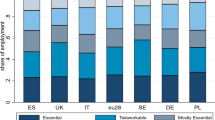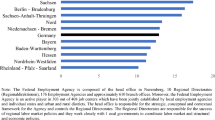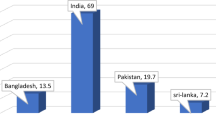Abstract
The paper is concerned with decreasing state ownership in post-communist Eastern Europe and a concomitant decline in the proportion employed in the state sector. Many individuals have shifted into private sector employment, self-employment or unemployment. The literature on sectoral shifts in employment in Eastern Europe is summarised, and from this it is argued that there will be a growing differentiation between private sector employees and state sector employees in economic, social and political terms. Data is then analysed based on a survey in 1995 of around 1000 households in each of four cities – Budapest, Prague, Warsaw and Krakow. Similar patterns emerged in the four cities. Consistent differences in working conditions and rewards are already evident between the self-employed, private sector and state sector. These conflicting economic interests are reflected in contrasting attitudes to the economy and polity amongst those employed in different sectors.
Similar content being viewed by others
References
Böröcz J. and Róna Tas A., 1995: Small leap forward: emergence of new economic elites. Theory Soc. 24: 751-781.
Campbell J., 1996: An institutional analysis of fiscal reform in post-communist Europe. Theory Soc. 25, 45-84.
Centeno M. and Rands T., 1996: The world they have lost: an assessment of change in Eastern Europe. Social Res. 63, 369-402.
Duke V. and Grime K., 1994a: Urban cleavages in the emerging democracies of Eastern Europe. In: Nagel S. and Rukavishnikov V. (eds), East Europe Development and Public Policy. Macmillan, London, pp. 3-16.
Duke V. and Grime K., 1994b: Privatisation in East Central Europe: similarities and contrasts in its application. In: Bryant C. and Mokrzycki E. (eds), The New Great Transformation. Routledge, London, pp. 144-170.
Dunleavy P., 1980: The political implications of sectoral cleavages and the growth of state employment (in 2 parts). Political Studies 28: 364-383, 527–549.
Estrin S., 1994: Economic transition and privatisation: the issues. In: Estrin S. (ed.), Privatisation in Central and Eastern Europe. Longman, London, pp. 3-30.
Evans G. and Whitefield S., 1995: The politics and economics of democratic commitment: support for democracy in transition societies. Brit. J. Pol. Sci. 25: 485-514.
Ferge Z., 1996: Social citizenship in the new democracies: the difficulties in revising citizens rights in Hungary. Int. J. Urban Regional Res. 20, 99-115.
Frydman R. and Rapaczynski A., 1994: Privatisation in Eastern Europe: Is the State Withering Away? Central European University Press, Budapest.
Grime K. and Duke V., 1993: A Czech on privatisation. Regional Studies 27: 751-757.
Grime K. et al., 1997: The Social and Economic Consequences of Privatisation in Central and Eastern Europe. Final report to the European Union, University of Salford.
Kolankiewicz G., 1995: Regime transformation as the rationalisation of social capital. In: Conference for David Lockwood. Department of Sociology, University of Essex, Colchester.
Misztal B., 1996: Post-communist ambivalence: becoming of a new formation? Arch. Europ. Sociol. 37: 104-140.
Mizsei K., 1993: Bankruptcy in the Post-communist Economies of East Central Europe. Westview, Boulder, CO.
Nelson D., 1996: Civil society endangered. Soc. Res. 63: 345-368.
O'Connor J., 1973: The Fiscal Crisis of the State. St Martins, New York.
Róna Tas A., 1994: The first shall be last? Entrepreneurship and communist cadres in the transition from socialism. Am. J. Sociol. 100: 40-69.
Rose R. and Makkai T., 1995: Consensus or dissensus about welfare in post-communist societies. European J. Polit. Res. 28: 203-224.
Rychard A., 1996: Beyond gains and losses: in search of 'winning losers'. Social Res. 63: 465-485.
Sik E., 1994: From the multicoloured to the black and white economy: the Hungarian second economy and transformation. Int. J. Urban Regional Res. 18: 46-70.
Sikorska J., 1995: Social differences in consumption: realisation strategies for consumption aims: Quoted in Rychard, A. (see above).
Stark D., 1992: Path dependence and privatisation strategies in East Central Europe. East European Pol. Soc. 6: 17-54.
Stark D., 1996: Recombinant property in East European Capitalism. Am. J. Sociol. 101: 993-1027.
Szelenyi I., 1988: Socialist Entrepreneurs: Embourgeoisement in Rural Hungary. Polity Press, Cambridge.
Tittenbrun J., 1995: The managerial revolution revisited: the case of privatisation in Poland. Capital Class 55: 21-32.
Author information
Authors and Affiliations
Rights and permissions
About this article
Cite this article
Duke, V. No longer working for the state: residual state sector versus private sector. GeoJournal 49, 17–24 (1999). https://doi.org/10.1023/A:1007081905761
Issue Date:
DOI: https://doi.org/10.1023/A:1007081905761




